Coronavirus and UK kids
A Newsround Survey
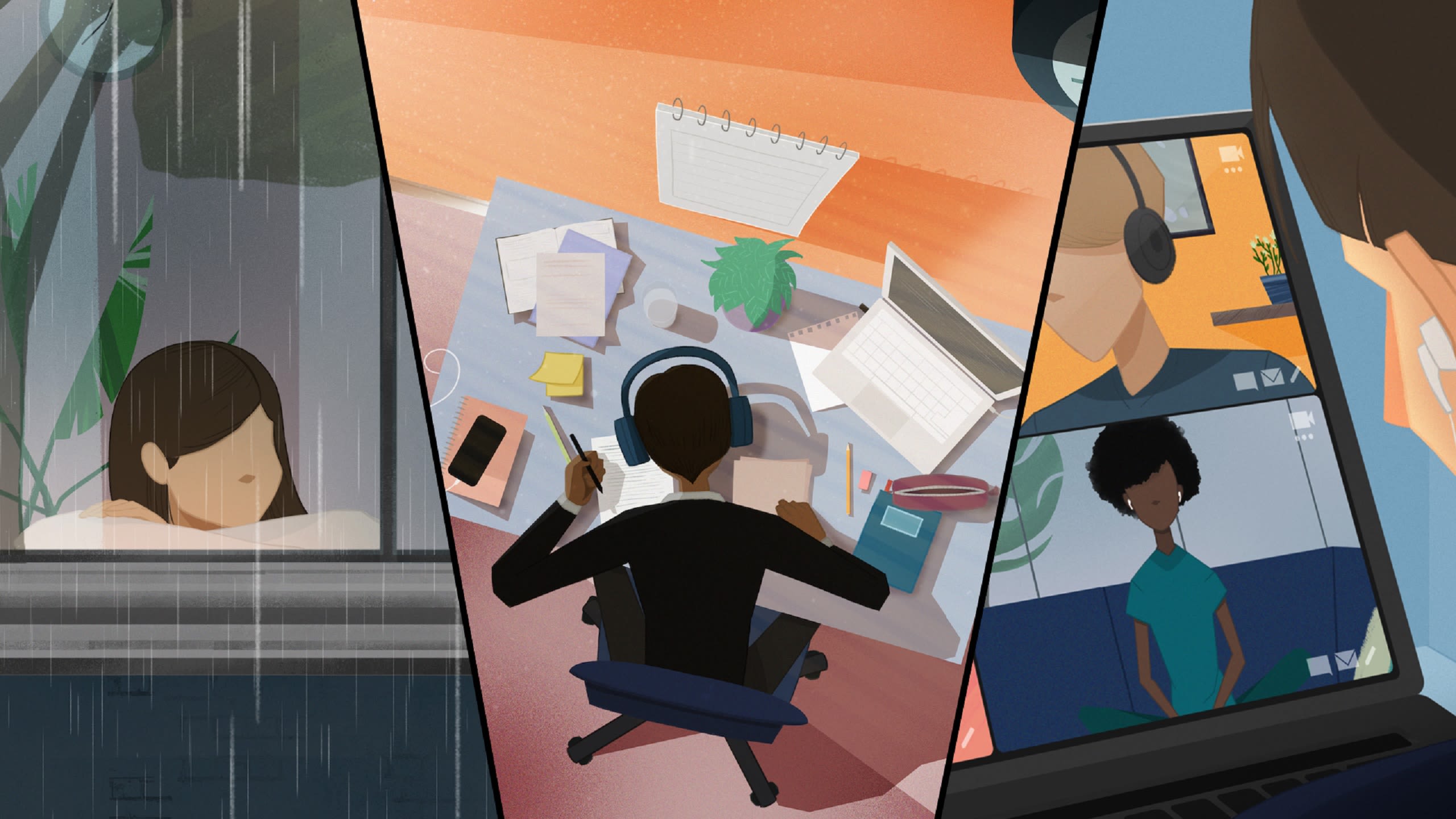
It's been a year like no other.
In 2020-2021, we've seen changes to our lives that none of us have ever experienced before - not you, your parents or even your grandparents.
A year we'll always remember and talk about.
Many of us have had to learn how to live in a world of masks, social distancing, bubbles, tests and home-schooling.
We've clapped for carers, painted rainbows and spent a lot of time washing our hands.
We've also done PE in our front rooms, had video chat birthday parties and gone on lots and lots of walks.
But the main thing we've done is to try to keep ourselves and our friends and families safe as the coronavirus pandemic spread around the world.

For some of you, the experience of the last 12 months was different - and even fun at times - but for others it was much more difficult.
And after a year like this one, Newsround wanted to know how you felt about everything that has happened.
How did you feel about remote learning, what issues are the most important to you and who are your role models?
With the help of the survey company Survation, we asked 2,013 6-16 year olds from villages, towns and cities all over the UK about their experience of a very unusual year.
We also spoke to lots of you directly.
Here's what we learned.
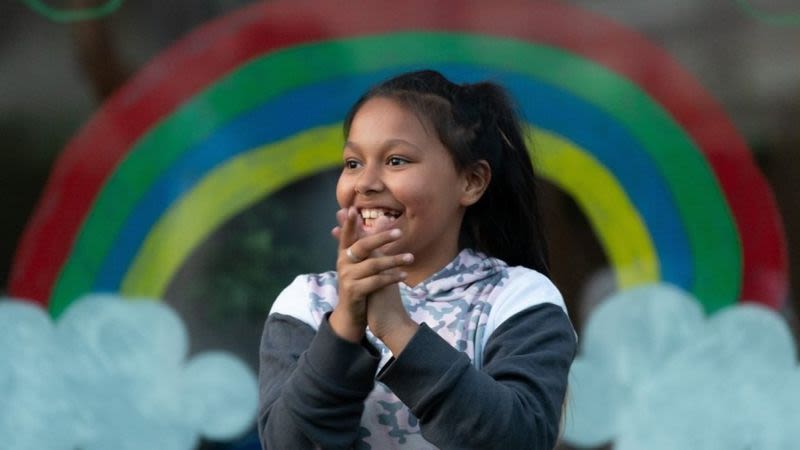

How have you been feeling?

For half of the children in our survey, time spent during lockdown has either been a better experience or it hasn’t really changed things.
We asked those taking part to think about how they have felt during the last year - and 24% said they felt better while a quarter (25%) felt the same as usual.
Being at home more with your parents and guardians, and spending more time together with your immediate family, was obviously a nice change for some of you.
But many others had a different experience.

Just under half (49%) said they felt "worse than usual" during the experience. And that number rises for girls (51%) and for older children (53%).
57% of young people questioned also said they'd done less exercise than normal. Listen to Talia and Rene's stories.
All of this reflects what many parents, charities and politicians have been saying during the past year - that by missing out on school and not seeing their friends, young people have faced some of the biggest challenges to their mental health and well-being during this period.

The Children's Commissioner for England, Dame Rachel de Souza - whose job is to stand up for young people's rights - told Newsround: "It’s really important that we now listen to what children have to say about their experiences over the last year."
She says she'll be working with the Prime Minister to make sure the government is "doing everything it can to help children feel happier and positive about the future".
Boris Johnson has promised to support children's mental health in England and said £79m will be made available to "boost mental health support for children and young people" in schools and the community as we come out of the pandemic.
In Scotland, the devolved government has announced an extra £139 million to support mental health in adults and children.
But the Scottish Children’s Services Coalition - a organisation for those helping care for children - says much more is needed "to address the crisis facing our children and young people".
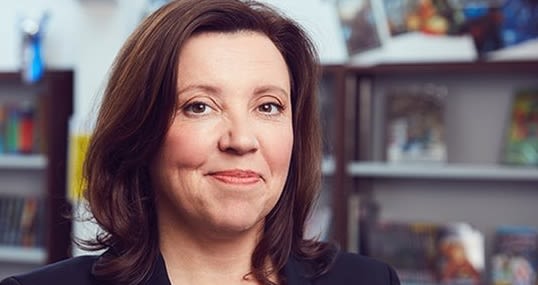

What's important to you?
We asked the young people who took part in the survey to tell us how important certain things were to them, including family, friends and education.
We also asked about role models and what big issues mattered to them - both now and when they think about the future.
Many gave very similar answers.
When it came to what was most important, seeing family and friends came out on top - with more than nine out of 10 (98%) saying that was important to them - with 70% of girls saying it was very important.
Next came health - which is pretty understandable given the focus on our health during the pandemic. Again more than nine in 10 (93%) said it was important to them.
Two-thirds (66%) agreed that money was important, with it being most important to 13-16 year olds (75%).

We also asked those taking part to rank the top three issues that matter most to them.
As before, family health (64%) and coronavirus (59%) were the most commonly chosen answers, with exams/school work (57%) and having enough money (45%) the next most popular answers in children's top three.


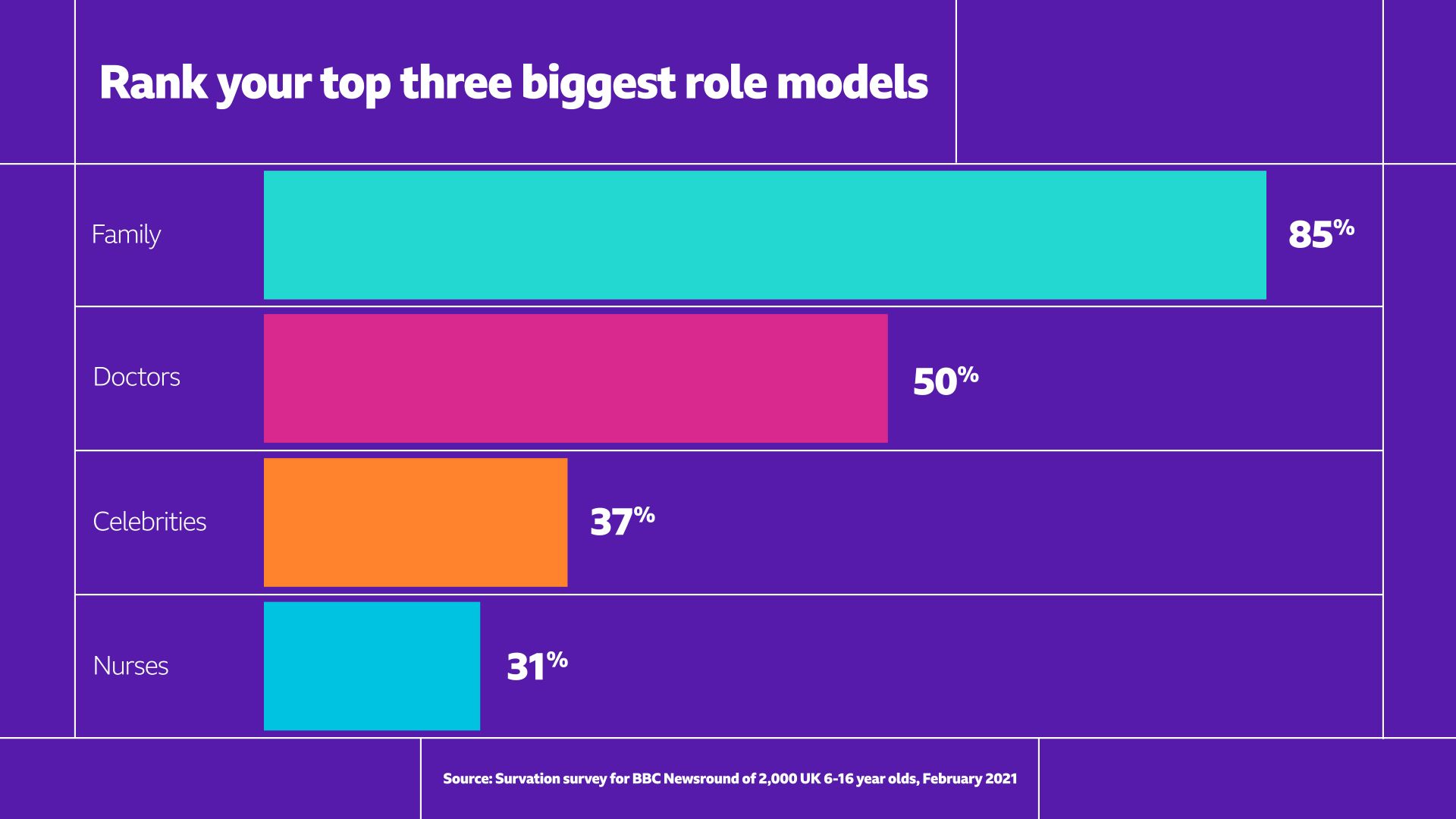
When we asked about people they looked up to, family came top by a long way.
Nearly three in five (57%) chose their family members as their number one role model.
When asked to select their top role models from a list, more than four out of five (85%) put family members in their top three - along with doctors (50%), celebrities (37%) and nurses (31%).

So does that mean everyone wants to work in medicine when they grow up?
Not quite! The jobs that were most often in people's top three were YouTuber, scientist and teacher.
Family and friends

One of the hardest things for young people during the pandemic has been missing out on time with friends and wider family. More than nine out of 10 said seeing those people was important to them.
For young people who haven't been to school, who don't live near their friends, grandparents, cousins or aunties and uncles, the loss of close and daily contact with people they care about and usually share their lives with has been really tough.
While lots of people have relied on communication using video calls, group chats and even letters, we all know that's not the same as being with someone in person.
Although one in four (17%) told us that they'd seen their friends more or the same amount as usual, four out of five (82%) said they'd seen their friends less than usual.
With lockdowns, travel restrictions and no schools or clubs, that's not a surprise - but it's not an easy thing to deal with.
Seeing and speaking to people outside your home can be a real help to well-being for lots of us - especially as 46% of the young people who took part in the survey told us that they felt their family was more stressed during lockdown than they normally would be.
Rahiq and Jada told us how their family lives and family bubbles have been affected.
Three-quarters said that before coronavirus they saw their grandparents more than once a month (73%), but that changed dramatically with nearly four out of five (78%) saying they'd seen their grandparents less than usual.
Experts tell us that spending time with people that we love and care about is really important to our well-being and is an important way of dealing with difficult times.
But don't bottle up your worries. It's really important to talk to an adult you trust, such as your parents or teachers, about how you're feeling.


Remote learning:
How was it for you?

One of the biggest changes to the lives of children during the last year has been the interruption to schooling.
It has affected millions of you, and in our survey more than four in five (85%) told us school was important to them.
Government data shows that across Great Britain between May-June 2020, 87% of parents said their child had been home-schooled due to the Covid-19 pandemic - and that matches what our survey told us: 13% said they had spent some time in school, but the rest said they had been learning remotely during lockdown.
So how did you feel about learning at home, away from the classroom?



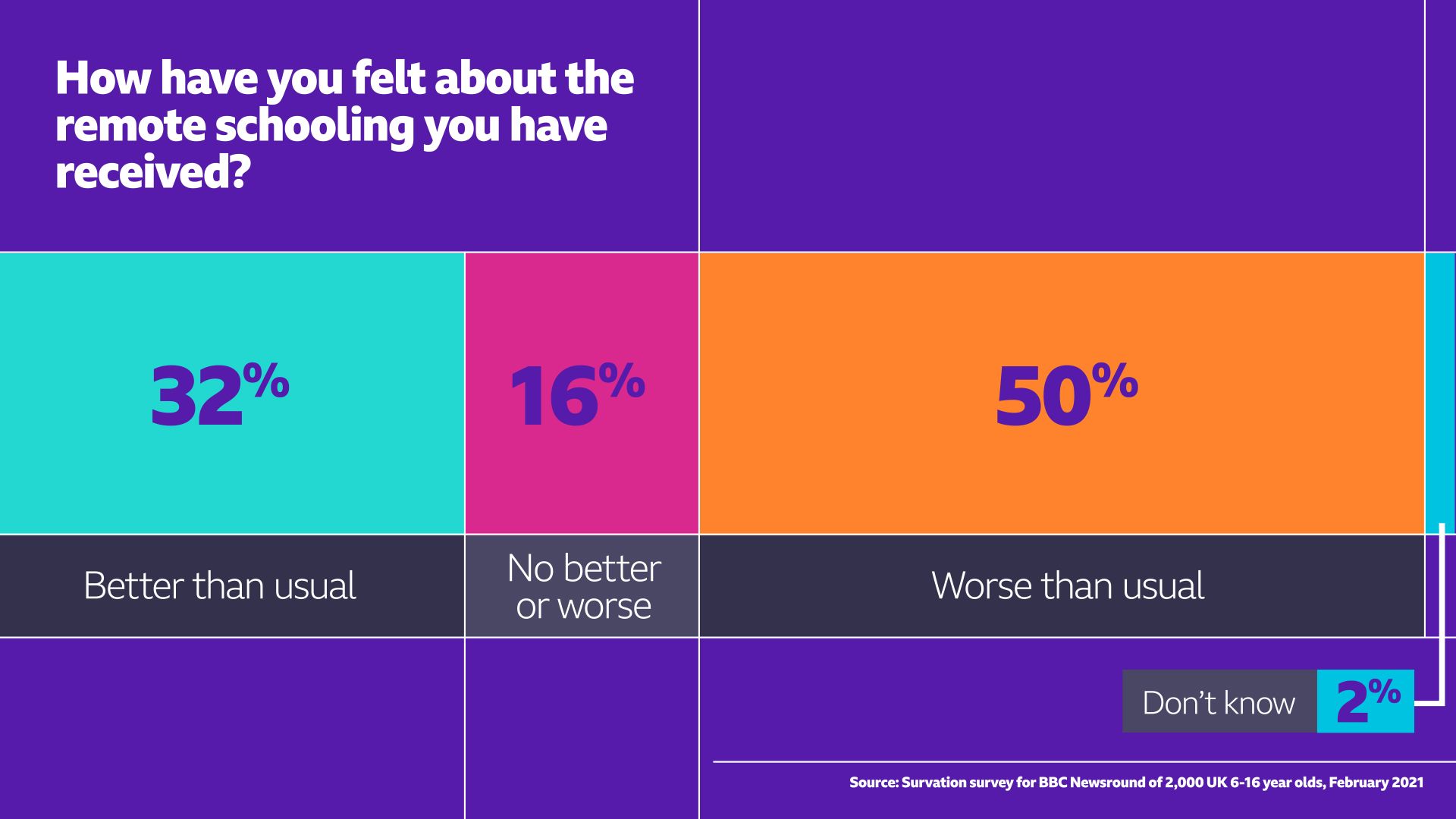
The results show very different experiences.
Nearly one in four (23%) told us they were happy about not going into school, and nearly a third (30%) didn't mind either way.
But the biggest group was those who didn't enjoy it. Almost half (45%) of those home-learning said they were unhappy about not being in school.
That's easy to understand as remote learning is very different to being in class: there's less socialising, less fun and less PE!
But what about the work you had to do? Well, on that issue we heard differing views.

A third of children said the schooling they received at home was better than usual, while 16% said it was the same. But half (50%) said it was worse than being in school. Girls (52%) and younger children were most disappointed (53%).
Experiences may also have been different depending on where children went to school. In London, 38% of pupils said remote learning was better than going to school in person, compared to 27% in Scotland. In fact, almost six out of 10 pupils (58%) in Scotland said remote learning was worse than going to school in person.
We asked the Scottish government about this and it told us that they had also done a survey of young people which showed that most learners are "content with the variety of subjects" on offer, agreed that they get support from their school and most found it easy to access learning online.
"We know that remote learning can be challenging and that young people can miss their friends and the school community. However teachers, parents and learners have been working hard to make sure that learning can continue effectively," they told us.

A big factor for remote learning was having the necessary kit to join in properly.
In our survey, more than a quarter (28%) of those who took part said they didn't have a device to themselves - they either didn't have one at all (1%) or they had to share it with one (19%), or more than one (8%), other person.
Eva explains the difficulties she had at first.
Many charities and head teachers have spoken about the 'digital divide' as a reason that some children have got more out of remote learning than others.
The digital divide is the gap between those who have access to the technology (laptops/tablets) and internet services they need to do proper home-schooling, and those who don't.

During periods of lockdown, or of self-isolation, many children didn't have the devices to study properly and, despite government schemes in all four nations to provide laptops and tablets to families who needed them, some people still really struggled.
Following research carried out by Lloyds Bank in 2020, the Learning Foundation education charity estimated one million children and young people in the UK didn't have good enough access to devices or internet at home.

Extra support for schools

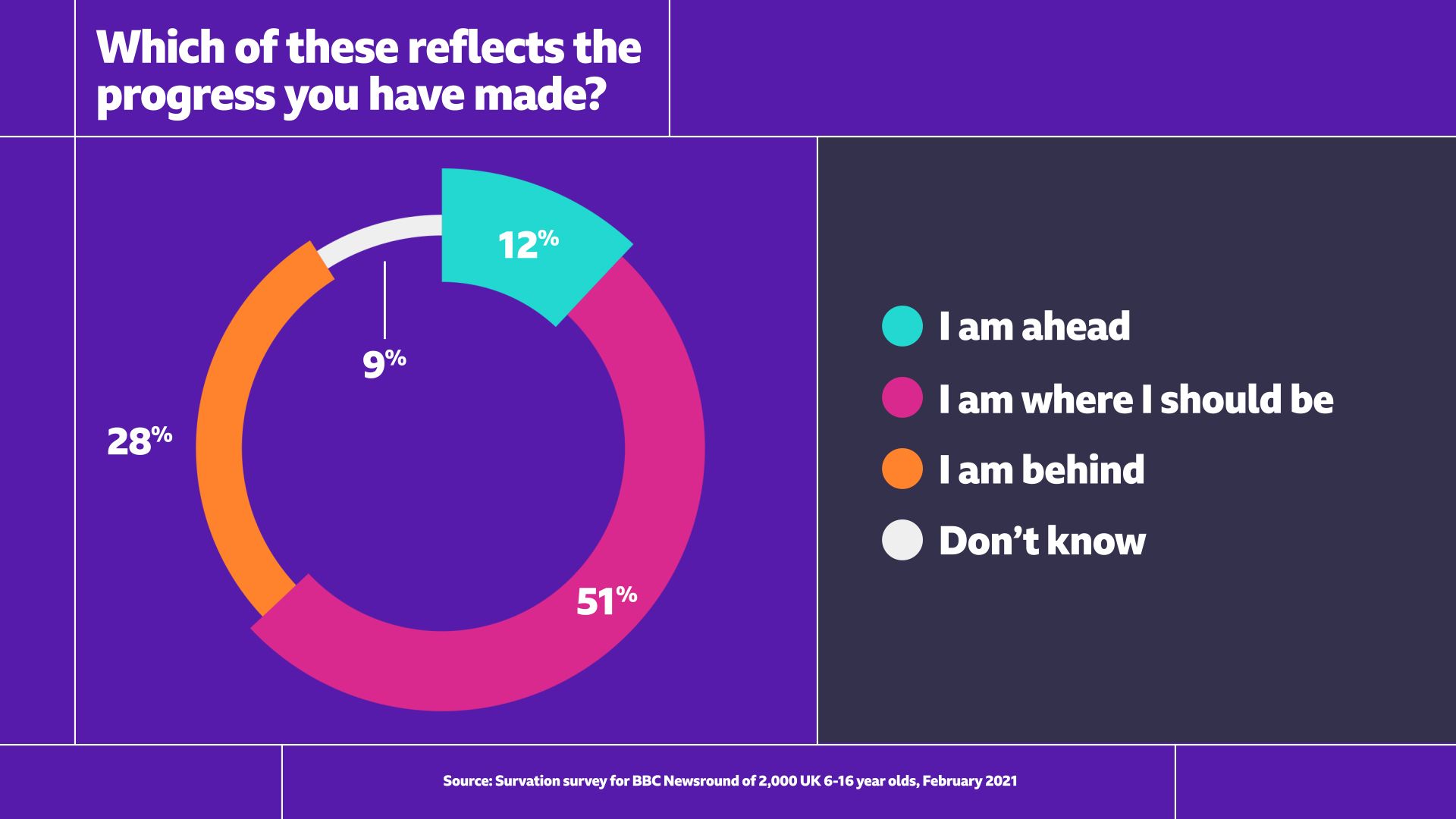
When it comes to the amount of time in school that has been missed, it's estimated that many pupils have lost around half a school year in face-to-face learning.
So what did we learn from our survey about this?
More than half (51%) of those who replied said that they felt they were where they should be in their schoolwork.
More than one in 10 (12%) felt they were actually ahead of where they should be, but more than a quarter (28%) said they felt they were behind.
As well as promising money for extra teachers and school staff, Scottish First Minister Nicola Sturgeon says she wants to ensure that "the impact of lockdown on our young people doesn’t turn into a long-term impact they are saddled with for the rest of their lives".
Prime Minster Boris Johnson wants to give children the "opportunities they deserve to learn and fulfill their potential", and in Northern Ireland extra funding has been announced, including for activities in the summer. In Wales, the government says its recovery plans must "meet the needs of learners who have been most affected by this period".
While some school leaders have welcomed the promise of more money to help pupils with their work, others warn that there is still a very long way to go to ensure the most disadvantaged pupils get the support they need.
Also some experts say that while extra help, lessons and even tuition, will be useful for some pupils, it will also be important not to overwhelm students.


Help and support
If you have been affected by any of the issues raised in this article, there is lots of support out there for you to get help.
You can speak to an adult you trust, like a parent, guardian or a teacher.
You can also visit the Newsround website by clicking here where you can find loads of tips and advice if you are upset by the news.
BBC Own It also has loads of tips for managing your life online and in person - and offers ideas for how to reach out to others and support your friends.
The NSPCC website has lots of advice for children and young people.
And you can also contact Childline, which is run by the NSPCC, on 0800 1111 to speak for free to an advisor at any time.

